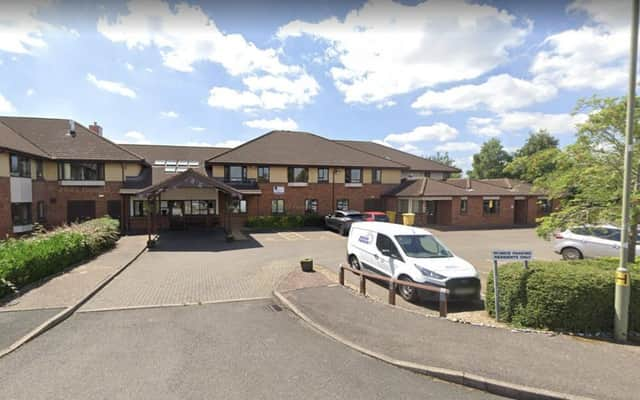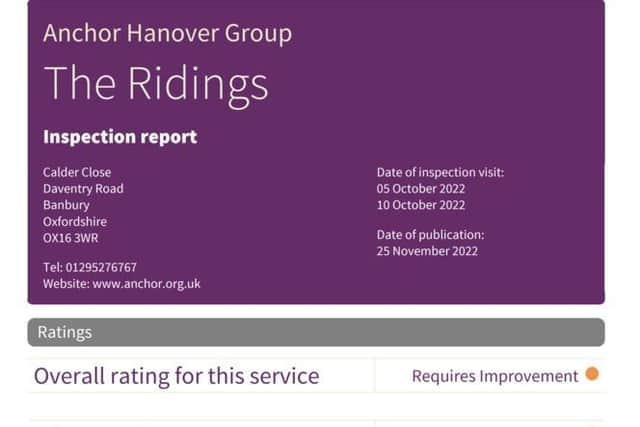Banbury care home downgraded to 'requires improvement'


The Anchor home, in Calder Close, Grimsbury can house up to 48 older people, some with dementia. The CQC made their inspection on October 5. The previous inspection was in May, 2018.
"We received concerns in relation to people not having access to emergency services in a timely manner. As a result, we undertook a focused inspection to review the key questions of safe, effective, responsive and well-led only,” said the inspection team in their report.
Advertisement
Advertisement
The inspectors found the home was not always safe, effective, responsive or well-led. They spoke with ten people about the care provided, reviewed a range of records and spoke with six members of staff.


They found learning had not always been fully embedded following events which had impacted on people's health. For example, following an incident when a staff member failed to seek help from health emergency services, a similar incident occurred three months later – learning from the previous incident had not reduced the risk.
“We received mixed feedback from people and relatives about staffing levels, staff skills and their knowledge of people's needs. One person told us ‘The quality of staff is poor, I don't feel they have a lot of training.’ Another said ‘some of the newer ones don't know much about me, what my needs are and I am concerned sometimes if this trend is going to continue’.
"Although we saw there were enough staff during our inspection, some were rather task-oriented, leaving people with no interaction or verbal communication. The registered manager told us new starters were in the course of receiving on-going training."
Advertisement
Advertisement
Inspectors found issues with PRN (medicines administered when required) including one person being given PRN medicines four times a day, posing a risk of addiction.
Some aspects of the service were not always safe and there was limited assurance about safety. There was an increased risk people could be harmed.
Some care plans, risk assessments and personal emergency evacuation plans (PEEPs) were past their review dates and not reflective of people's needs.
Not all health and safety checks were completed.
"We observed there was a lack of interaction between staff and people at times. We saw some staff talking about people in earshot of people,” said the inspectors.
Advertisement
Advertisement
The team received mixed but mostly negative feedback about the quality of food including limited choice and little for vegetarians with ‘so much food wastage’. Appropriate measures were not always taken to monitor people's nutritional needs.
Resident surveys had consistently highlighted concerns over the quality of food and availability of staff to interact with people for quite some time, however the provider had not taken action to engage with people around how they could improve the food quality and ensure people's preferences were met, or evidence they had explored further the concerns over staffing.
People's care plans and assessments were not always kept up-to-date to inform staff about changes in people's needs.
"During our inspection there was one person receiving end of life care. We saw the person's records were not always reflective of their needs. For example, the person had been prescribed with a controlled medicine for pain relief. However, their pain assessment tool had not been reviewed since May 2022 until the first day of our inspection after we requested the person's up-to-date pain assessment,” the report said.
Advertisement
Advertisement
“Governance systems had not always lead to improvements at the service. Feedback was sought, but improvements were still needed on how it was acted on. We received mixed feedback on whether people's and relatives' views were sought and acted on.”
People's care records did not provide sufficient information to inform staff about people's needs and preferences. The record-keeping regarding people involved in the ‘best interest’ process needed improvement.
The report said: “The culture of the home was not always inclusive or empowering. We saw some people received little or no engagement from staff. Staff did not always speak about people respectfully.”
However staff spoke positively about residents, with kindness and compassion.
Advertisement
Advertisement
“Residents' and relatives' meetings were used to seek people's feedback. People and their relatives were welcomed to provide their feedback by completing a survey on the quality of the service provided to people. However, some people told us they were not always listened to during residents' meetings,” said the report.
People could be assured they were cared for safely as staff knew how to keep people safe and protected them from harm. Staff were recruited safely and there were enough staff to support people.
Staff were supported with regular training, supervision and appraisal. People had access to other health professionals when needed.
People were supported to have maximum choice and control of their lives and staff provided them with care in the least restrictive way possible. However, people's choices and preferences were not always met by the service.
Advertisement
Advertisement
Activities were taking place and the inspectors received positive feedback about these. The provider had systems in place to investigate and respond to complaints.
The CQC has requested an action plan to understand what the home will do to improve the standards of quality and safety. It will work alongside the provider and local authority to monitor progress. It will continue to monitor information we receive about the service, which will help inform the next inspection.The full report can be seen here.
District manager Jonathan Palmer for The Ridings said: "We are disappointed by the findings and before the report was published put in place a robust action plan, addressing the issues highlighted. Colleagues at the home have been reminded of our values and behaviours, a new catering team is in place with food menus and our activities programme revised in consultation with our residents and there will be better care record management. Our residents’ wellbeing is always paramount."